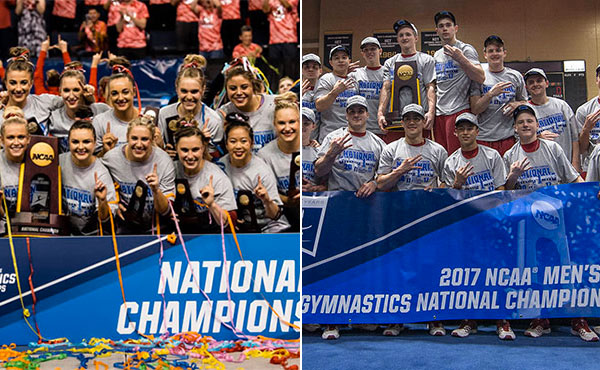
By Nick McCarvel
All season long, University of Oklahoma head women’s gymnastics coach K.J. Kindler had her team focusing on a different number at each meet. The digits weren’t scoring goals or performance-based must-haves, but a distraction tactic married to a deeper meaning.
In short, a number with a purpose.
At the National Collegiate Women’s Gymnastics Championships in St. Louis last month, the number on the night of finals was eight. Eight because of the number of letters in O-K-L-A-H-O-M-A and – when you turn the number “8” on its side – it makes the infinity sign. “And that means our limits are boundless,” Kindler explains carefully.
It has been a season that held few boundaries for Kindler’s women, as well as the OU men under the direction of head coach Mark Williams, the Oklahoma Sooners were dual NCAA champions in gymnastics – for the second year in a row.
“We’re still on cloud nine actually,” says Yul Moldauer, the sophomore standout that took the 2017 AT&T American Cup title in March, invoking another meaningful number. “It was a Sooner Magic feeling.”
—
The only number with real meaning at the end of the season is one. There is no doubt that Oklahoma’s teams are No. 1 in the country with their flurry to the finish, marking a third straight title for the men and third in four years for the women.
The women set a scoring record (and margin of victory record) at the NCAA Super Six. The men won an 11th title in the program’s history (second all-time) and haven’t lost a meet of any kind since the 2014 NCAAs (when they were second), amassing a streak of – ready for this number? – 76 straight victories.
“The first year these seniors were here, we were second at NCAAs, and we had been second four years in-a-row before that,” remembers Williams, who won his eighth title as head coach. “After 2015, they sort of made it their mission to not lose again. Those guys are probably the best senior class we’ve ever had at Oklahoma. That’s saying a lot.”
The seniors – six men and six women – were what helped drive both winning teams in a lot of ways, explains Moldauer. Maggie Nichols, the freshman who turned an injury-marred Olympic season into a NCAA national title, agrees.
“Our seniors have been through everything before and mentored all of us,” she says. “Having amazing seniors helped us get that extra boost. I really wanted to help the team out. I wanted us – I wanted the seniors – to walk away with one more national championship. I wanted to make them proud.”
—
The pride of the two Sooner gymnastics programs seems to be just that: Build champions with leadership and let the wisdom lead to success. Williams has developed a system of accountability, as has Kindler, a mark of two successful coaches who have proven they know how to motivate.
“By the time they’ve been here for three or four years, they really do have a sense of how it is we become better and how to buy into the process of being a great team,” says Williams. “Those guys become just as much of motivators to the rest of their teammates as the coaching staff that has to critique what they’re doing.”
“What (our seniors have) done is created and maintained a culture here at Oklahoma where every athlete knows what the standard is and knows how our gym works and what our values are,” adds Kindler. “I think the culture that they’ve created, that’s the biggest thing they’re going to leave behind – not those three national championships. They’ve left their mark.”
Six national titles – if you add them all up – among 12 seniors. An impressive four-year legacy, to say the least. Allan Bower, Colin Van Wicklen, Josh Yee, Todd Dowdy, Thao Hoang and Alex Powarzynski on the men’s side, in addition to Chayse Capps, Reagan Hemry, Charity Jones, Kara Lovan, Nicole Turner and McKenzie Wofford for the women.
—
While they would end their respective national championships as going-away winners, the weekend was not perfect for either team – the women in St. Louis and the men in West Point, N.Y.
It was inside Chaifetz Arena that Nichols had begun to realize her Olympic dream might not come true last June as a knee injury came too close to Rio qualifying. But 10 months later, she was back in the same place and – after a fall on the beam in prelims – determined to change her luck in the Gateway City.
“I knew I had to turn it around for finals and forget about the all of the mistakes I had in this place,” Nichols explains. “I wanted to do what I had been doing in training and help the team out as best I could.”
Oklahoma was “a little tight” in prelims, so Kindler and her coaching team tried to amp them up with a shout of extra confidence – and that number eight.
“As a coaching staff, you’re trying to dig things up out of your athletes that is going to resonate,” she says. “We were saying ‘end on empty,’ which basically means ‘give it all you’ve got. Let it flow!’ You can’t control the results, but what you can control is what you put into this and the mentality you approach it with. We wanted them to be completely emotionally free. This is what they work hard for everyday.”
The men – like the women – would find their best when it mattered most, Williams’ mantra being “Let it Reign” as Oklahoma tried to become the first men’s team to go back-to-back-to-back since Nebraska did so when it won five straight from 1979 to 1983. Williams had been a Cornhusker back then.
“We wanted to have a three-peat,” he shares. “It’s the first time in the history at Oklahoma that we’ve won three national championships in a row. I had a chance from 2005-07, and we didn’t get it done. We had Jon Horton and Taqiy Abdullah-Simmons, and we didn’t get it done. We got to 2004 and didn’t get it done, either. That was something that was special for this group to choose as a motivating goal for ourselves.”
After a rocky start on floor for the OU men, Oklahoma found its footing in the third rotation of the finals behind a stuck landing from an injured Reese Rickett and never looked back. Reigning – again – and making history in the process.
—
In the moments, days and weeks since the national titles were claimed, accolades have been showered on the OU teams from far and wide. Williams’ team was hollered congratulations when they visited Times Square in New York City the day after their big win, while Nichols says she can’t go even a few steps on campus recently without a fellow student commenting on their big win.
Moldauer says the triumph has come from within, matching greatness with more of it: “This team has dominated for three years now, so you have to focus on acting like you’re working from the bottom or saying that your team is 0-0. This year, I had to work on my mental game and find where my place was with this team so I could help them win.”
The 2016 NCAA all-around champion, Moldauer finished second individually this year, but Williams calls his approach “refreshing,” adding: “He’s so emotionally invested in the program. It’s been a real pleasure to have him as part of the team.”
Kindler took on Nichols after 2016 heartbreak and helped turn that into 2017 euphoria. Nichols says winning NCAAs was incomparable to anything she did in elite gymnastics.
“I have never felt such emotion after competing,” she says, but adds that she “didn’t need the validation” of this success. Instead, it’s been the guidance of Kindler she is most thankful for, a coach that has seen her through every step in a trying year of transition.
“It’s always exciting to have your season culminate in something like this,” Kindler says, speaking slowly, with purpose. “I’ve been coaching for 25 years and 22 of them I never had this opportunity. For our athletes to have this opportunity one of those four years is remarkable, and for our seniors to have done it three out of four years is outstanding.”
And for two teams to do so at the same school simultaneously? You’ll be searching for infinity to find another story just like that one.




